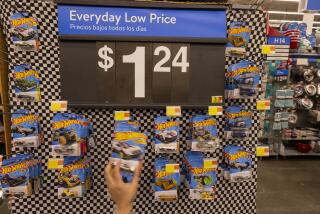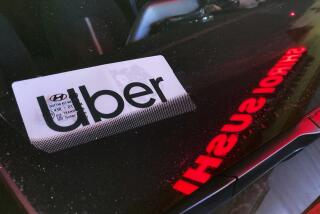Furor surrounds Amazon’s price-comparison app
- Share via
Amazon.com Inc. and the nation’s bricks-and-mortar retailers are in combat again, this time over the online giant’s price-comparison tool that enables shoppers to quickly check out prices at rival merchants.
An uproar over the Price Check shopping app, used on mobile devices, erupted after Amazon launched a promotion for Saturday that gives customers 5% off (up to $5) on up to three qualifying items on its site if they check the prices of those goods on the app while browsing at a physical store.
Retail trade groups denounced the offer, saying it unfairly encouraged shoppers to check products at stores and then buy them online. Sen. Olympia Snowe (R-Maine) entered the fray, calling the promotion “anti-competitive” and “an attack on Main Street businesses that employ workers in our communities.” Amazon defended the device as pro-consumer and not anti-small business.
The skirmish is the latest dispute between Amazon and traditional retailers, which have complained for years that tax laws often give online retailers an unfair advantage in states where they are not required to collect sales tax. The fight was especially heated this year in California before the state and Amazon agreed that Amazon would start collecting sales tax next September.
Last month, the company appeared to reverse its position on collecting state sales taxes nationwide with it support of the Marketplace Fairness Act, a bill in Congress. The legislation would allow states to levy sales taxes on goods sold there regardless of where the online retailer is located.
Amazon’s Price Check, promoted in recent months, has users identify a product by scanning its bar code, taking its picture or saying or typing in its name. The app then pulls up prices offered through Amazon.
Snowe urged Amazon to stop the promotion being offered Saturday. “Small businesses are fighting every day to compete with giant retailers, such as Amazon, and incentivizing consumers to spy on local shops is a bridge too far,” she said in a statement.
Retail groups agreed. A spokesman for the Alliance for Main Street Fairness said “no retailer can compete” with Amazon because as an online retailer, the company is not required to collect sales taxes in many states.
The Retail Industry Leaders Assn., which represents many big-box retail chains, said the app unfairly encourages shoppers to use bricks-and-mortar shops as “showrooms” to check out a product before buying online.
“This is an underhanded way to send shoppers online,” said Jason Brewer, the association’s spokesman. “This app allows Amazon to exploit a loophole that allows them to sell the exact same product as brick-and-mortar stores and not charge sales tax.”
In its defense, Amazon said Friday that the app is mostly intended for shoppers who want to compare prices at major retail chains. The app also features prices from third-party sellers — including more than 2 million businesses of all sizes — that sell through its website.
“The goal of the Price Check app is to make it as easy as possible for customers to access product information, pricing information and customer reviews, just as they would on the Web,” the company said in a statement.
Mark Reback, a consumer advocate with Consumer Watchdog in Santa Monica, said the Amazon app could benefit shoppers. “It could definitely be good price competition for consumers,” he said.
The recent anger over Amazon’s promotion may have stemmed from the ongoing controversy over online sales taxes, said Kerry Rice, a senior Internet analyst at Needham & Co.
Meanwhile, the campaigns to shut down Amazon’s promotion will probably just give the retailer free publicity, Rice said.
“If the senator had just let it go and not said anything, then it wouldn’t get the press and headlines,” Rice said. “It’s attracting people’s attention to the sale.”
Besides, the app exemplifies competitive behavior, he said. “It doesn’t make sense to call it anti-competitive behavior.”
More to Read
Inside the business of entertainment
The Wide Shot brings you news, analysis and insights on everything from streaming wars to production — and what it all means for the future.
You may occasionally receive promotional content from the Los Angeles Times.











